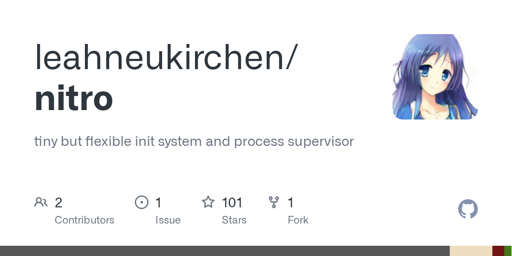cross-posted from: https://programming.dev/post/36342010
Nitro is a tiny process supervisor that also can be used as pid 1 on Linux.
There are four main applications it is designed for:
- As init for a Linux machine for embedded, desktop or server purposes
- As init for a Linux initramfs
- As init for a Linux container (Docker/Podman/LXC/Kubernetes)
- As unprivileged supervision daemon on POSIX systems
Nitro is configured by a directory of scripts, defaulting to /etc/nitro (or the first command line argument).



Two groups of people went to war over a difference of opinion.
New! Different! Change! Bad!
Hey, this works better than the old way. Let’s use this instead.
‘Change resistance’ was the standard gaslighting. No one said ‘different bad’, in a time when enterprise linux had just switched from sysVinit to upStart. What they said was “this is built bad and wants to do too much, poorly. We don’t like this.”
And the response was “you’re old, you hate change,” and similar fallacies.
I think you mean “I don’t know how to do this in the normal way, so I’ll try this other thing.”
Plenty of people did. “What’s the point of change?” “I’m happy with Sys-V” “I don’t like Poettering”, “Lennart is too powerfull” and a lot more irrelevant and personal attacks.
Please don’t accuse me of gaslighting whilst gaslighting me in return. I was there, I lived through the worst of the Debian wars and saw some great people leave the project, and a side of some friends that I really didn’t like. But that war is done and I have zero interest in continuing it so I’ll leave this here.
You could equally mischaracterize it the other way around:
Fair, and representative of some opinions certainly.
But change, change is constant. Resist it and end up poorer and more bitter.
That can be true… but it depends on the change… emptying your bank account is a change that would make you poorer, and having all those who love you die would be a change that is likely to make you bitter (or at least, sad).
Also, a lot of ancient software introduces change with relatively frequency… the Linux kernel itself is in constant change, introducing new features, despite it having very strict rules concerning backwards compatibility.
The reason there was disagreement wasn’t about whether the new thing is good/bad just because it’s “New! Different!”… but about whether it was actually a good change or not.
In the same way, just because nitro is the new init system in town (a change from the current status Quo) does not mean it necessarily is better/worse, right?
Also, I remember that before systemd there was a lot of innovation when it comes to init systems… most distros had their own spin. And more diversity in components that now are part of systemd. I’d argue that ever since systemd became the de-facto standard, innovation in those areas has become niche. One could argue that there’s less change now, distros are becoming more homogeneous and more change-adverse in that sense.
Dude if you want to start a holy war with the Linux community over your first point, just mention Rust.
-dodges rotten fruit-
I am a linux noob but all the noobs support rust
Everyone should support rust. It’s a good idea. It prevents an entire class of vulnerabilities. But the old guard says “just stop making mistakes and C is fine” which is an incredibly dumb thing to say but here we are.
Rust is encroaching on their territory and they don’t want to learn the new thing, and newbs don’t see many compelling reasons to learn the old thing, so they are fighting eachother.